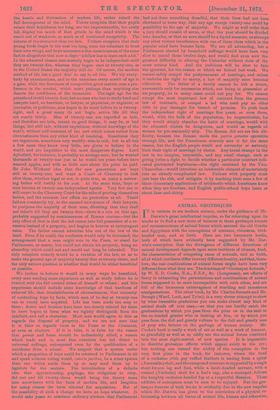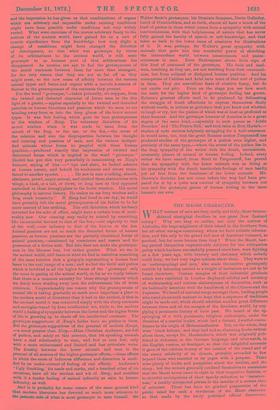ANIMAL GROTESQUES.
IT is curious to see modern science, under the guidance of Mr. Darwin's great intellectual impulse, so far returning upon its tracks as to find a new store of humour in those grotesque recasts and reconstructions of animal forms which amused the old Greeks and Egyptians with the conceptions of centaurs, chimaeras, bird- headed men, and so forth. Here are two humorous books, both of which have evidently been suggested by Mr. Dar- win's conception that the divergence of different directions of animal development depends upon mere incidents of climate, food, the characteristics of competing races of animals, and so forth, all of which incidents differ in every different locality, and that, there- fore, the real combinations of animal forms might have been very different from what they are. The drawings of "Grotesque Animals," by W. E. D. Cooke, R.A., F.Z.S., &c. (Longmans), are efforts of fancy in exhausting the permutations and combinations of animal forms supposed to be most incompatible with each other, and are full of the humorous extravagance of startling and monstrous amalgamations. The other book, by Mr. Charles Bennett and Mr. Brough (Ward, Lock, and Tyler), is a very clever attempt to show by what insensible gradations you can make almost any kind of animal shade off into man,—so that you can hardly catch the graduations by which you pass from the prize ox in the stall to the ox-headed grazier who is looking at him, or by which you pass from the dull and greedy vulture to the dull and greedy man of prey who fattens on the garbage of human society. Mr. Cooke's book is really a work of art as well as a work of humour, so gracefully as well as so oddly are the animal forms combined
into the most night-marish of new species. It is impossible to describe grotesque effects which appeal solely to the eye ; but nothing can exceed the oddity of the conception in the very first plate in the book, for instance, where the head of a cockatoo svith gay ruffled feathers is issuing from a spiral (Arun onite) shell, and the compound creature is supported by a single stout human leg and foot, while a lamb-headed servant, with a conical (Turitella) shell for a fool's cap, also a monoped, follows the haughty cockatoo-headed fop at a respectful distance. These oddities of conception must be seen to be enjoyed. But the gro- tesque humour of both books is evidently due to the new impulse which. Mr. Darwin has given to the conviction of a physical re- lationship between all forms of animal life, human and otherwise, and the impression he has given us that combinations of organs' which are arbitrary and impossible under existing conditions might have been possible under conditions not very widely varied. What were exercises of the merest arbitrary fancy to the nations of the ancient world, have gained for us a sort of remote significance from the knowledge how very slight a change of conditions might have changed the direction of development, so that what was grotesque by virtue of its arbitrariness to the ancient world, is still more grotesque to us because part of that arbitrariness has disappeared. As cousins are apt to feel the grotesqueness of the moral contrasts between them far more than strangers, for the very reason that they are not so far off as they might seem, so the new sense of affinity between the various animal types and forms and organs adds a certain keenness of flavour to the grotesqueness of the contrasts they present.
For the word "grotesque,"—taken primarily, we suppose, from the twisted and distorted character of forms seen in the dim light of a grotto,—applies especially to the twisted and distorted parodies on human functions and passions which we seem to see winding away from us into the deep gloom of the lower animal types. It was this feeling which gave its rare grotesqueness to the wisdom of lsop. The voluntary distortion of his moral wisdom when it was made to issue from the mouth of the frog, or the ass, or the fox,—the sense of the relation and also the disproportion between the thought and cunning and passions of men, and the various undigni- fied animals whose forma he peopled with these human qualities,—produced exactly that impression of twisted and dislocated forms which is implied in the word "grotesque." Hazlitt has put this very powerfully in commenting on ..Esop's humour, saying of him :—" Ape and slave, he looked askance at human nature, and beheld its weaknesses and errors trans-
ferred to another species He saw in man a talking, absurd, obstinate, proud, angry animal, and clothed these abstractions with wings, a beak, or a tail, or claws, or long ears as they appeared embodied in these hieroglyphics in the brute creation. His moral philosophy is natural history. He makes an ass bray wisdom and a frog croak humanity." If lEsop had lived in our day, he would have probably felt the moral grotesqueness of bis fables to be far more instead of less striking. The odd distortion which his fancy invented for the sake of effect, might have a certain tone of semi- reality now. Our cunning may really be related by something like immemorial descent to that of the fox,—our rapacity to that of the wolf, —our industry to that of the beaver or the bee. Animal passions are not so much the distorted forms of human passions, as human passions are the partially straitened forms of animal passions,—straitened by conscience and reason and the possession of a divine soul. But this does not make the grotesque- ness in the likeness less, but rather greater. What we see in the animal world, still bears to what we find in ourselves something of the same relation that a gargoyle representing a human bead bears to the real image of a man; and we feel the thrill and pathos which is involved in all the higher forms of the grotesque' only the more in gazing at the animal world, so far as we really believe that there is a common ancestry for those strange instincts which we dimly trace winding away into the subterranean life of brute existence. Unquestionably one reason why the grotesqueness of animal life is taking gradually so much more important a place in the modern world of literature than it had in the ancient, is that in the ancient world it was connected simply with the sharp contrasts and analogies traced by keen intellectual wit, while in the modern world a feeliogof sympathy between the lower and the higher forms of life is growing up to shade off the intellectual contrasts. The grotesque suggestions of 2Esop's fables have no pathos in them. But the grotesque suggestions of the greatest of modern .sops, —a much greater than 7Esp,—Hans Christian Andersen, are full of pathos, and solely on this account, that his speaking animals have a real relationship to man, and feel as men feel, only with a more embarrassed and limited and less articulate voice. The kinship between the lower animals anci man is the greatest of all sources of the higher grotesque effects,—those effects in which the sense of ludicrous difference and distortion is modi- fied by an under-current of feeling of real affinity. Andersen's ' Ugly Duckling,' his toads and storks, and a hundred other of his creations, have all the wisdom and wit of .,Esop, and combine with it a tender feeling of animal infirmity as akin to human infirmity, as well.
And it is probably for some reason of the same general kind that modern literature has devoted so much more attention to the pathetic side of what is most grotesque in man himself. Sir
Walter Scott's grotesques, his Dominic) Sampson, Davie Gellatley, Laird of Dumbiedikes, and so forth, almost all have a touch of the kind of pathos in them which comes from a sympathy with animal inarticulateness, with that helplessness of nature that has never fully gained the faculty of speech or self-knowledge, and that takes us back to the lower races of creatures for illustrations of it. It was, perhaps, Sir Walter's great sympathy with animals that gave him this wonderful power of sketching the intermediate world between consciousness and uncon- sciousness in man. Even Shakespeare shows little sign of this kind of command of the grotesque. His fools and mad- men, touching as they are, are not touching from their creatureli- ness, but from eclipsed or disfigured human qualities. And his conceptions of Caliban and Ariel have none of that sort of pathos in them. They are marvellous feats of creative fancy, but do not excite our pity. Even on the stage you see how much the taste for the higher kind of grotesque feeling has grown. Robson's greatest efforts used to be produced by delineating the struggle of dumb affections to express themselves dimly without words, in actions so grotesque that you knew not whether to laugh or cry, but the pathos of which was at least as profound as their humour. And the grotesque humour of America is in a great degree of the same kind,—especially in such poems as ' Little Breeches' and The Prairie Bell,' and such tales as Bret Harte's,— studies of rude natures helplessly struggling for a half-utterance. It would seem, too, that the great Russian author Turguenieff has produced studies of the grotesque of a pathos even higher, and precisely of the same type,—where the secret of the pathos lies in the deep sympathy of the writer with the dumb, unconscious, creaturely phases of animal or human feeling. Indeed, every writer we have named, from Scott to Turguenieff, has proved that his sympathy with the lower animals was as living as his sympathy with the dumb inarticulate feelings of men hardly yet set free from the dumbness of the lower animals. Mr. Darwin's doctrine has not come before the way had been pre- pared for it by a quite new current of sympathy between our race and the grotesque germs of human feeling in the races beneath our own.







































 Previous page
Previous page